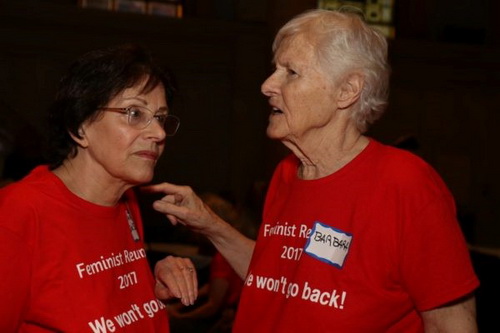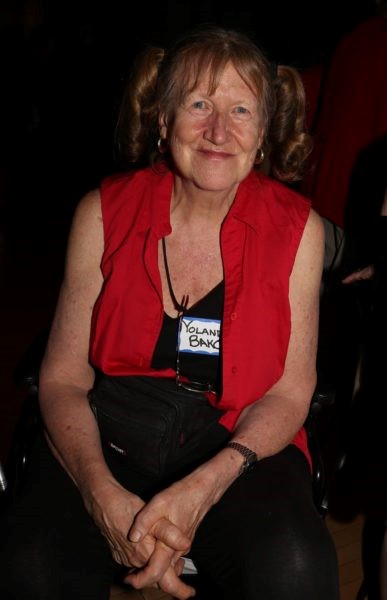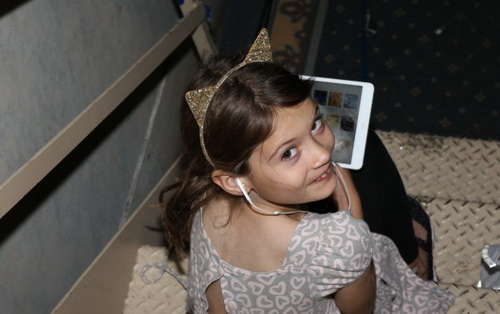Second Wave Feminists Get Together in New York – Still Feisty After All These Years

Carole DeSaram, left, and Barbara Love, organizers, during the reunion of second-wave feminists at Judson Memorial Church in Greenwich Village. Photos by Tequila Minsky
BY MARY REINHOLZ
The pictures flashing across a wall inside Judson Memorial Church in Greenwich Village showed icons of the women’s liberation movement from the last half of the 20th century: famed activists like Betty Friedan, Gloria Steinem, Bella Abzug, Shirley Chisholm and Flo Kennedy, all of them taking aim at varied forms of gender inequality in America. Many used their printed words as weapons.
A couple of venerable speakers, who lived through the movement’s early triumphs and disappointments, delivered stinging attacks against Donald J. Trump, 45th president of the United States. Kate Millett, 82, author of the best selling “Sexual Politics,” a 1970 critique of misogyny she found in esteemed works by male literary lions such as D.H. Lawrence, Henry Miller and Norman Mailer, needed assistance in walking to the open microphone but sniped at Trump in her opening remarks.
“I don’t know what’s going on with the Russians,” Millett said, referring to purported Kremlin-directed hacking to influence the Nov. 8 election, “But Hillary (Clinton) won the popular vote.”
Otherwise, Trump’s persona did not loom large at an event focused on marking an historic time that had nothing to do with him.
“We’re still here, but so is that maniac in the White House,” said Susan Brownmiller, also 82 and author of a groundbreaking 1975 treatise on rape, “Against Our Will: Men, Women and Rape,” after she took the mic at a reunion of second wave feminists held June 10 in Judson’s second floor hall.

Proud to be at the reunion.
Brownmiller went on to recount the need for today’s activists to resist right-wing efforts throughout the U.S. to roll back Roe v. Wade, the 1973 Supreme Court decision that granted women the right to terminate unwanted pregnancies. Brownmiller noted that she carried a sign promoting abortion during one of the women’s marches that sprang up around the U.S. a day after Trump’s inauguration on Jan. 21.
“Abortion is empowerment,” she said to applause from about 120 other older women, most of them white professionals, former and present, who were seated at long tables, drinking bottled water and nibbling on chicken, egg and tuna sandwiches. “Motherhood should be for women who want to be mothers. It’s a choice, not a mandatory destiny for anyone anywhere in the world,” Brownmiller added, sounding like a young radical on the barricades 50 years ago when reproductive rights, along with equal pay for equal work, were rallying cries for second wave feminists.
“Right on!” shouted a woman of a certain age who stood in the back of the hall, where there were books on sale by Millett; by feminist lawyer / author Jo Freeman and by self-described “liberation psychologist” Phyllis Chesler, author of an updated version of her 1972 “Women and Madness,” which sold 2.5 million copies back in the day. (Chesler, an emerita professor of psychology at City University of New York, has since turned more conservative, chiding feminists in academia for becoming too politically correct in one of more recent books.)
Among other things, the reunion made it clear how second wave feminism created an astonishing array of new women’s voices–ranging from the anarchic man-hating screed of Valerie Solanas’s “Scum Manifesto” published the same year she shot Andy Warhol in 1968 to popular novels like Erica Jong’s “Fear of Flying” in 1972. Printed material on display included handouts describing the decades-long reissuing of “Our Bodies, Ourselves,” a controversial booklet put together by a Boston feminist collective in 1969. It sparked the women’s health movement, and was pilloried as “obscene trash” by Reverend Jerry Falwell of the Moral Majority during the early 1980s.

Yolanda Bako founded New York City’s first shelter for abused women.
Billed as a speak-out and sponsored by the nonprofit Veteran Feminists of America, the event drew at least 20 women from out of state, according to Carole DeSaram, 78, a former New York City chapter president of NOW (National Organization for Women). She is a board member of V.F.A. who organized the reunion with Barbara J. Love, an 80-year-old lesbian activist, writer and editor of a 2006 directory called “Feminists who Changed America (1963-1975).” Attendees paid $50 each for tickets to cover the costs of food and renting the hall at Judson, where volunteers welcomed them in red T-shirts emblazoned with the words, “We Won’t Go Back!”
DeSaram gave the speakers two minutes each to offer their messages. Some went considerably overtime, such as mixed-media artist Suzanne Benton from Connecticut, who at one point in her speech donned a white mask and intoned in a raspy sepulchral voice: “I am from the graves of women martyrs here to give you courage!”

Artists Adele Aldrige, left, and Suzanne Benton.
One jaunty feminist wearing a gym jacket stirred laughter and frequent applause as she taught the audience sign language by singing lyrics that included lines like: “If it wasn’t for women / We would not be living.”
Another speaker noted that the ERA (Equal Rights Amendment), dormant since its deadline for passage by Congress in 1982, had been ratified this year by Nevada in March, “and only two more states” are needed for possible passage by Congress. She urged the audience members to contact their local politicians to support the long-stalled amendment. It guarantees, among other things, that “equality of rights under the law shall not be denied or abridged by the United States or by any state on account of sex.” The Nevada senators passed a measure sent to them by the state Assembly, which had already approved it, according to NPR.
Several men also showed up, including a bearded gent from Oregon who wore a pink pussy hat favored by feminists marching against Trump and a T-shirt bearing the slogan, “I’m With That Nasty Woman!” He heaped praise on Berkeley archivist Laura X, founder of the National Clearinghouse on Marital and Date Rape.
The reunion’s sole male speaker lauded the late activist/writer Andrea Dworkin, author of sexually explicit books like “Intercourse.” and sometimes called “Feminism’s Malcolm X.” Dworkin’s failed efforts in the early 1980s (with legal scholar Catherine MacKinnon) to outlaw pornography as a form of hate speech and sex discrimination that incites rape and violence against women created a schism in the women’s liberation movement between the foes of smut and “sex positive” feminists, Many in the movement worried about censorship.
An earlier split came when Betty Friedan, a founder of NOW and author of “The Feminine Mystique,” a world famous 1963 book often credited with fueling the start of second wave feminism, decried lesbians in the movement before finally accepting the so-called “Lavender Menace” about a decade later.
But there was no evidence of division among the aging feminists gathered at Judson’s hall last month. Early on in the program, Rebecca Lubetkin of New Jersey, a longtime NOW activist, reminded the assembled sistas that the Center for Women’s History — run by the New-York Historical Society — opened its museum doors in March on Central Park West. The new center requires potential contributors to fill out forms and send them in advance to determine if its administrators can use artifacts that must tell “personal stories” and “reflect women’s struggle for their rights.”

A wired future feminist pricks up her cat ears at the reunion.
There were profiles in courage at the get-together as some attendees, defying the infirmities of age, arrived with their canes and walkers and greeted old friends.
Yolanda Bako, 70, from the Bronx, rolled up in her wheelchair to the microphone. She explained how she founded the “first” New York City shelter for abused women in 1976 in Sunset Park, Brooklyn. An activist in the movement against domestic violence, Bako was coordinator of the Rape Prevention Committee of the New York City chapter of NOW. She helped coordinate the 1976 Women’s Walk Against Rape at night in Central Park.
DeSaram told The Villager later that Bako “took on a project that no one else wanted to touch because society at that time treated rape victims like it was their fault or they asked for it. The police were terrible.”
And so it went as the speakers chronicled and celebrated some of the accomplishments of second-wave feminism. One of the last at the mic was Alix Kates Shulman, 84, author of the bestselling 1972 “Memoirs of an Ex-Prom Queen.” Shulman was active in the civil-rights and antiwar movements of the early 1960’s before she became a radical feminist.

Pussyhats, of course, were to be found.
“Most of us didn’t know [much] about the first wave of feminists,” she said, alluding to the suffragists who fought for passage of the 19th Amendment to the U.S. Constitution, which granted women the right to vote on Aug. 26, 1920. “Now the young women who are newly calling themselves feminists and who joined the women’s march after Trump’s [inauguration] look at us like we looked at the first wave. We’re separated in time because we’re from the 1960s.
“That’s something they want to correct,” Shulman continued. “Their history is us. We made history, we tried to change history but now we are simply history. I think that is one of the goals we always had. I’m just very grateful that at my age I’ve lived long enough to see that happen with a generation of feminists coming up.”
When the speak-out ended around 4:30 p.m., painter Diana Kurz, an 81-year-old Soho resident who first joined a women’s march for peace in 1967, remarked that she was “very moved” by the words of the second-wave feminists who keep on keeping on.
“I think being active and committed to a cause keeps you young,” Kurtz said.
Manhattan attorney Emily Jane Goodman, a retired New York State Supreme Court justice, e-mailed this reporter on Sunday: “It’s great to see that the energy is still with us and our revolution continues.”
Another version of this article first appeared in The Villager, a downtown Manhattan weekly newspaper.
Comments
Leave a Reply
You must be logged in to post a comment.



